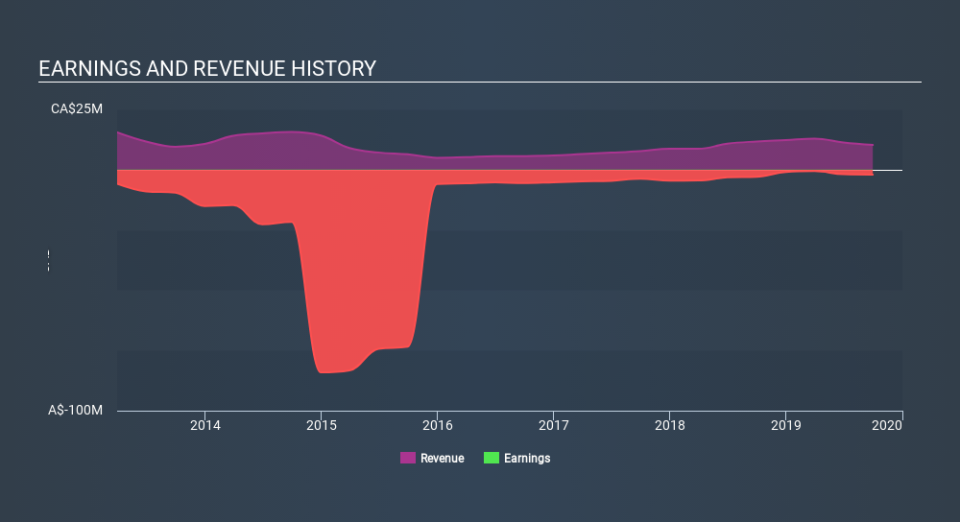Some New Zealand Energy (CVE:NZ) Shareholders Have Taken A Painful 82% Share Price Drop

Long term investing works well, but it doesn't always work for each individual stock. It hits us in the gut when we see fellow investors suffer a loss. Spare a thought for those who held New Zealand Energy Corp. (CVE:NZ) for five whole years - as the share price tanked 82%. And some of the more recent buyers are probably worried, too, with the stock falling 33% in the last year.
We really hope anyone holding through that price crash has a diversified portfolio. Even when you lose money, you don't have to lose the lesson.
See our latest analysis for New Zealand Energy
New Zealand Energy isn't currently profitable, so most analysts would look to revenue growth to get an idea of how fast the underlying business is growing. Shareholders of unprofitable companies usually expect strong revenue growth. Some companies are willing to postpone profitability to grow revenue faster, but in that case one does expect good top-line growth.
Over five years, New Zealand Energy grew its revenue at 4.5% per year. That's not a very high growth rate considering it doesn't make profits. It's not so sure that share price crash of 29% per year is completely deserved, but the market is doubtless disappointed. While we're definitely wary of the stock, after that kind of performance, it could be an over-reaction. We'd recommend focussing any further research on the likelihood of profitability in the foreseeable future, given the muted revenue growth.
You can see below how earnings and revenue have changed over time (discover the exact values by clicking on the image).
This free interactive report on New Zealand Energy's balance sheet strength is a great place to start, if you want to investigate the stock further.
A Different Perspective
While the broader market gained around 8.8% in the last year, New Zealand Energy shareholders lost 33%. However, keep in mind that even the best stocks will sometimes underperform the market over a twelve month period. Unfortunately, last year's performance may indicate unresolved challenges, given that it was worse than the annualised loss of 29% over the last half decade. Generally speaking long term share price weakness can be a bad sign, though contrarian investors might want to research the stock in hope of a turnaround. It's always interesting to track share price performance over the longer term. But to understand New Zealand Energy better, we need to consider many other factors. Case in point: We've spotted 2 warning signs for New Zealand Energy you should be aware of, and 1 of them is potentially serious.
If you would prefer to check out another company -- one with potentially superior financials -- then do not miss this free list of companies that have proven they can grow earnings.
Please note, the market returns quoted in this article reflect the market weighted average returns of stocks that currently trade on CA exchanges.
If you spot an error that warrants correction, please contact the editor at editorial-team@simplywallst.com. This article by Simply Wall St is general in nature. It does not constitute a recommendation to buy or sell any stock, and does not take account of your objectives, or your financial situation. Simply Wall St has no position in the stocks mentioned.
We aim to bring you long-term focused research analysis driven by fundamental data. Note that our analysis may not factor in the latest price-sensitive company announcements or qualitative material. Thank you for reading.

